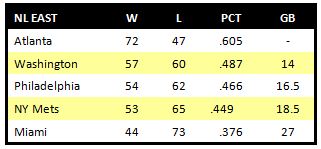History Doesn’t Favor The Braves

With a 14-game divisional lead, the Atlanta Braves have plenty to be happy about but history tells us the club might want to mute any celebrations just yet.
The Atlanta Braves are having a season to remember. Sporting the best record in all of baseball, the club has put together winning streaks of eight, 10 and 14 games respectively across the year; has been almost untouchable at home, compiling a 40-17 record at Turner Field; and has climbed out to an almost insurmountable lead in the NL East. Life is good for the Braves, but it might not be for much longer.

Atlanta’s dominance extends beyond the NL East though. On its most recent MLB Futures list, Bovada has also listed the club at 11/4 to win the National League pennant, behind only the Los Angeles Dodgers (9/4). The Braves are listed at 6/1 to win the World Series, leaving the club behind only the Detroit Tigers (5/1) and Dodgers (11/2). In short, a lot is expected of the Braves come October.
But history tells us that bettors fancying the club’s chances this year might want to hold fire before they lay any cash down. Sure, the Braves have a lineup built for postseason play and there’s plenty of historical statistics to support a club with such a solid record (especially at home), but there’s one particular area that has the alarm bells ringing; that big divisional lead.
Since the invention of the wild card in 1994, only two clubs have won their division by 10 or more games and gone on to win the World Series that same season. The Braves did it in 1995, the first year of the revamped postseason format, and the New York Yankees did it in 1998. That means it’s been 14 years since a club managed to achieve this feat.
Since 1995, a total of 32 teams have won their division by 10 or more games (twice clubs have finished with an identical record but more than 10 ahead of the third-place team, which we have included in our search criteria). Only six have made it to the World Series, with just the Braves and Yankees winning it all. Perhaps more alarmingly, only 15 have made it beyond the Division Series.
In the National League, 10 of 17 clubs that have finished the regular season with a lead of 10 or more games in their division have failed to advance beyond the Division Series. That’s 59 percent of the time. The Braves themselves have fallen at this hurdle on three occasions (from five attempts).
Five of the remaining seven have come undone in the League Championship Series. The 2004 St. Louis Cardinals advanced to the World Series and were swept by the Boston Red Sox, leaving the 1995 Braves as the only team to succeed. That means a National League team has been successful just six percent of the time.
In the American League, seven of 15 clubs have fallen at the Division Series stage, a ratio of 47 percent. Another four have lost the League Championship Series (27 percent), while three (20 percent) have advanced to the World Series only to stumble at the final hurdle.
Based on all of these numbers, this year’s Atlanta side faces a 53 percent probability of losing in the Divisional Series, a 28 percent probability of losing in the NLCS, and a 13 percent probability of losing the World Series. This leaves just a six percent chance of winning it all.
But why have these clubs faired so badly when they excelled in the regular season?
Perhaps it’s the lack of ‘important’ games heading down the stretch. If the Braves maintain their current lead, they’ll be able to coast through most of September. When players don’t play big games, they lose that ‘big game’ mentality, which can be tough to turn on come that first postseason game.
In some cases it could simply be that the club plays in a weak division and that big lead doesn’t tell the whole story. This isn’t the case for this year’s Braves club. Yes, the NL East is weak (blame the Nationals for that) but the Braves are still the best team in baseball record-wise. They’ve compiled a 41-29 (.586) record against teams outside their division, and while that isn’t as impressive as the 31-8 (.795) record within the NL East, it’s still impressive.
Or maybe it’s simply because the baseball gods love a good underdog story.
Whatever the reason, there is a definite trend that says teams with huge divisional leads at the end of the season don’t win the World Series. While plenty of bettors are quick to shrug off such historical findings, stating that records are made to be broken, the very fact that 30 of 32 teams have failed to win a World Series after dominating a division should at least have you looking at some other teams.
But then again, if the 1995 Braves can do, who says the 2013 club can’t? Of course, with 43 games left on the slate, Atlanta isn’t quite guaranteed a double-digit advantage come September 30.




